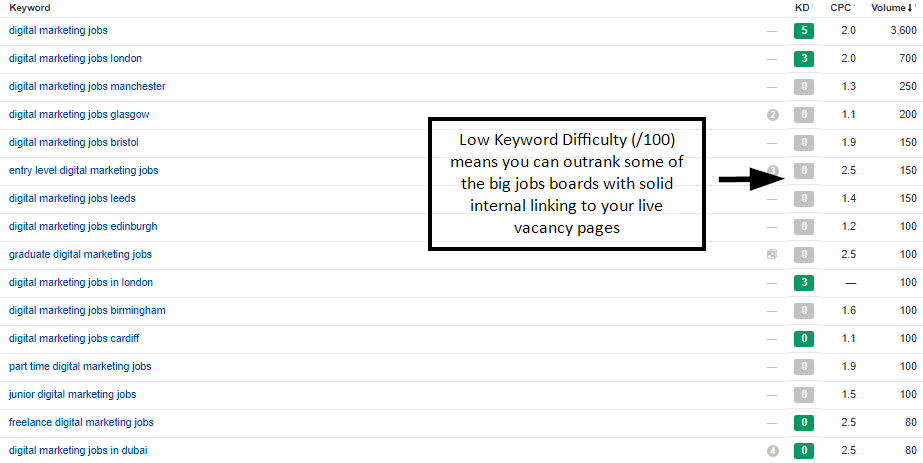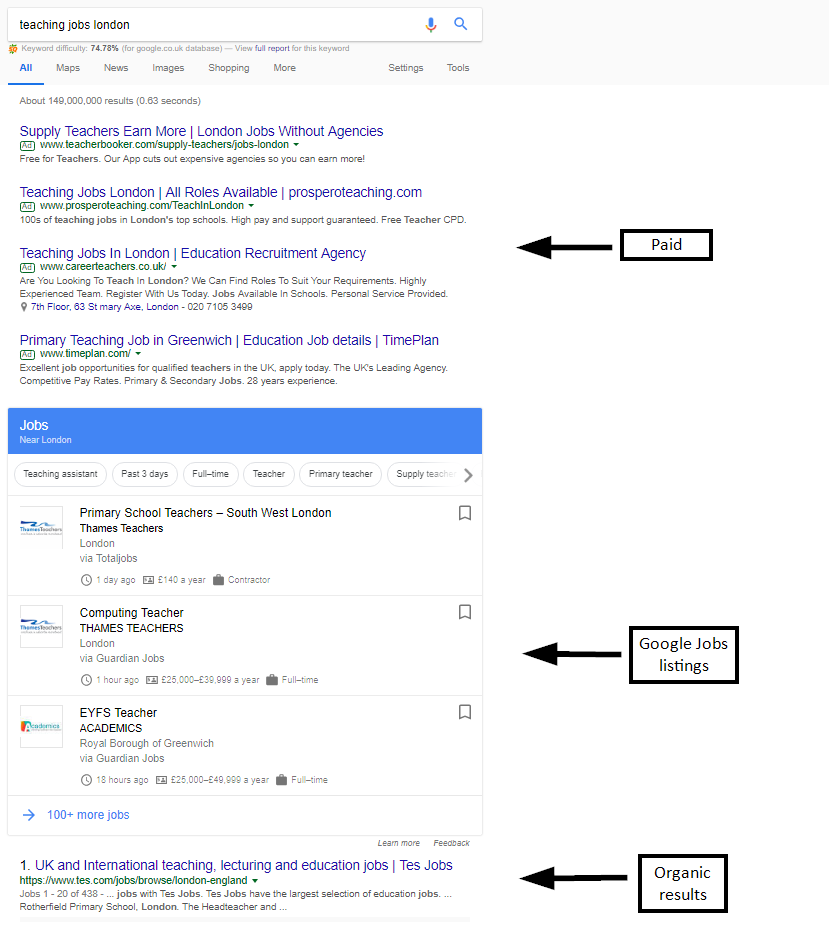With recruitment as competitive a market as it has ever been, it’s essential to ensure every careers page or job vacancy on your website is fully optimized in order to place it in front of the perfect candidate online.
They are some of the largest and most powerful websites around, but typically online job boards lack page authority, so while you cannot compete with them on a domain level, you can still outrank these huge companies with good SEO.
The next step is selling your vacancy to the candidate, which can sometimes be a tough process, but one that your job pages can definitely help you out with.
How should you go about doing this?
Conduct thorough keyword research
Your first port of call to ensure your careers pages are fully optimized is to conduct some thorough keyword research in order to identify relevant keywords to target on your job pages.
Location-specific job searches invariably have a favorable ratio between search volume and keyword difficulty (competitiveness), so it’s crucial to ensure you are targeting properly before you begin to optimize.
Ahrefs is my tool of choice for this due to the ease of use and array of filters available to use.

Use internal links
Internal links are your chance to tell Google which pages on your site are the most important. You can manage your internal links as you wish, but one recommended strategy is for any page you are trying to rank, you should point internal links at it from the more powerful pages on your website.
A good way of finding these authoritative pages is by using the ‘Top Pages’ category in ahrefs (other tools are available) which will filter your pages by URL rating (authority) in a descending order. You are left with a list of your most powerful pages ready to be linked from.
When trying to boost vacancy pages, adding natural looking anchor text along the lines of ‘Like what you are reading? See our latest job openings’ and linking to the live positions can work well.
Internal linking is an oft-underutilized strategy in SEO and Andy Drinkwater is one of the more prominent voices on the topic often sharing useful, actionable information with the SEO community.
Maximize your content
Ensure the copy featured on each of your careers pages is optimized to rank well. Your content should be specific to your company and the individual role, with a minimum word count of 250 words.
Make it enticing! And if your company has a personality, ensure you show it.
The copy itself should be relevant and informative to the user, answering any specific queries they may have. The more information you can give the prospect the better.
Avoid duplicate content at all costs and try to be creative – you can assume the job seeker is looking at a number of job posts so you really need to try and stand out here.
Go behind the scenes
Provide potential employees with a look behind the scenes at your offices before they apply for a role. This is likely to benefit both you and the prospective employee as they can see if the environment appeals to them.
An office walkthrough is the ideal way to show what life is like at your company, plus the tour footage can form part of your Google Business listing (if recorded by an accredited Google Business). Appearing alongside your company address and telephone number, it’s an effective way to boost your site’s local SEO.
If you really want to stand out from your competitors, however, why not invest in a 360 degree tour of your office? This can also be VR-based. Interactive and realistic, it’s the next best thing to being in your office in person and will help a prospective employee to really visualize working for you.
Once you’ve taken these factors into consideration, you also need to think about Google Jobs.
What is Google Jobs?
Having launched in the US in 2017 and the UK in July this year, Google’s new job search tool Google Jobs looks set to radically alter the way job seekers search for roles, also impacting recruitment agencies and their processes.
Google caused a disturbance in the flight industry with the launch of Google Flights, which saw an immediate uptake in bookings from customers who were frustrated by the tendency of airlines to withhold information about additional costs such as baggage fees whilst booking, in order to make their flights appear cheaper.
Inc.com attributed the success of Google Flights to increased transparency to customers, who are able to see all the relevant costs prior to booking a flight, plus any predicted delays. The impact of the launch of Google Flights was immediate, with Business Insider stating the platform was “…an embarrassment to the airline industry”.
The search engine’s success in identifying and capitalizing upon weaknesses in the travel and tourism industry is expected to be replicated in the recruitment industry with the launch of Google Jobs.
Simply recognizing users’ frustration at a lack of information, collating results at once and then proceeding to provide this information immediately results in a more valuable service for users.
What does the launch of Google Jobs mean for job vacancies online?
Google Jobs has been designed to simplify and speed up the process of job-hunting for the job-seeker. At the US launch of Google Jobs last year, Google CEO Pichai Sundar announced that the purpose of the tool was to “better connect employers and job seekers”.
Users are able to filter roles by key criteria such as necessary qualifications and experience, working hours, salary and commute. Recruiters and employment platforms currently working with Google Jobs include LinkedIn, Monster, Glassdoor and Payscale (but interestingly, not Indeed).
The impact on recruitments companies will be severe. Even if you were ranking #1, you will now have the Google Jobs ‘import’ sitting above you plus the usual PPC ads.
While it’s safe to assume that Google will weight Google Jobs above all other recruitment platforms, it is worth bearing in mind that the company recently received a $5 billion fine from the EU for abusing their Android dominance, so they may – initially at least – proceed with more caution than usual.
What does this mean for my job vacancy?
Google Jobs pulls through vacancies from many recruitment company sites and jobs boards. Unfortunately, at the time of writing, there isn’t the ability to get your (a SMEs) specific role featured in the platform without posting it on one of these jobs sites/boards.
For businesses who have steered clear of these in the past, now may be the time to start to signing up.
We can assume Google Jobs’ popularity is only going to increase so if you want to maximize the chance of your vacancy being seen, don’t get left behind.
from Search Engine Watch https://ift.tt/2wbIz6x


No comments:
Post a Comment